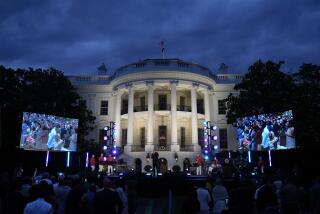History for One and All
- Share via
“W e’ve been listening to your history all year, so you just shut up and listen to ours.”
--A black student to a white one who was disrupting a class during black history month.
I strolled through the Baldwin Hills-Crenshaw Plaza the other day, admiring the exhibits commemorating this month, Black History Month. There were paintings and posters and exhibits and displays, all very informative and entertaining and inviting.
I left. I don’t know how soon I’ll go back.
These days, I approach Black History Month with mixed feelings. On one hand, it is a wondrous time of discovery, when the richness of African and African American contributions to this nation and the rest of the world are unveiled on a vibrant canvas.
Black children (and lots of adults, for that matter), starving for knowledge of themselves and their relevance in a nation that has told them they are irrelevant, feast upon a bounty of information about their forebears.
They learn of liberationists who fought in this country against kings, emperors, Presidents and slave masters, of engineers who designed great cities, of inventors whose creations--refrigerated trucks, gas masks, traffic lights, fiber-optics, mailboxes, spark plugs, whaling harpoons, light bulbs, typewriters, peanut butter, the elevator--helped drive this nation through the Industrial Revolution and beyond. Then there are the diplomats who changed the world balance, writers of amazing grace, millionaires, war heroes, explorers, scholars, distinguished jurists, and on and on.
And there are the fascinating sagas--the Middle Passage, the Great Migration, the Harlem Renaissance, the civil rights movement, the black diaspora spread across the Caribbean and Central and South America.
And the names: Crispus Attacks, Touissant L’Overture, Ralph Bunche, Fredrick M. Jones, Granville Woods, Artis Jenkins, Benjamin Banneker, Nat Turner, Denmark Vessey, Zora Neale Hurston, Fletcher Henderson, James Weldon Johnson, Lewis H. Latimer, Sojourner Truth, Harriet Tubman, Edward Kennedy Ellington, Louis Armstrong, Kenneth Clarke, G. Carter Woodson, Madam C.J. Walker, Langston Hughes, Ida B. Wells, John Sengstacke, Phyllis Wheatley, Fannie Lou Hamer, Edward Brooks, Marcus Garvey, Bishop Henry McNeil Turner, Katherine Dunham, Richard Allen, William Trotter, Mary McLeod Bethune. . . .
*
For nearly every black youngster, uncovering this treasure is truly moving. It is like suddenly having sight after living for years in blindness. I know, because when the scales were lifted from my eyes, I peered in awe. The history was so vast, so compelling, so astounding that at one point, I questioned how it could all possibly be true.
“If it were,” I asked myself, “why isn’t in my schoolbooks?”
The only African Americans in my American history book were slaves, runaway slaves, Booker T. Washington, George Washington Carver and opera singer Marian Anderson. (When my youngest son, then a 10th-grader at University High School, came home with his American history book two years ago, it was the same book.) There were no black authors in my English books. My teachers never assigned them. How could this be?
That brings me to my other feelings about Black History Month. As I strolled through that mall, even as I admired the work, there welled up in me a sense of anger. Why do we celebrate Black History Month in the first place? Because all the other months are white history months, because the lives and contributions of African Americans are somehow deemed by the historians, by the teachers, not worthy, not consequential enough to be placed on the main stage.
It is an insult, a mockery of the very people that black people honor that they are relegated to some side stage as though they were bit players, unimportant pieces in this nation’s, this world’s development. Separate but equal histories.
This history would have us all pretend that Crispus Attacks wasn’t the first person to die in the American Revolution, that Benjamin Banneker didn’t design Washington, D.C., that Artis Jenkins didn’t create fiber-optics, that Ralph Bunche was nowhere around during the establishment of the Israeli state, that Benny Goodman was the King of Swing and Fletcher Henderson was his valet.
African American history is not some sideshow, neither are the histories of Latinos, Native Americans, Asian Americans, or for that matter any of the people who have made this nation whatever it is. There should be no need for Women’s History Month (March) or Latino History Month (September).
Put everybody in the books.
More to Read
Sign up for The Wild
We’ll help you find the best places to hike, bike and run, as well as the perfect silent spots for meditation and yoga.
You may occasionally receive promotional content from the Los Angeles Times.






